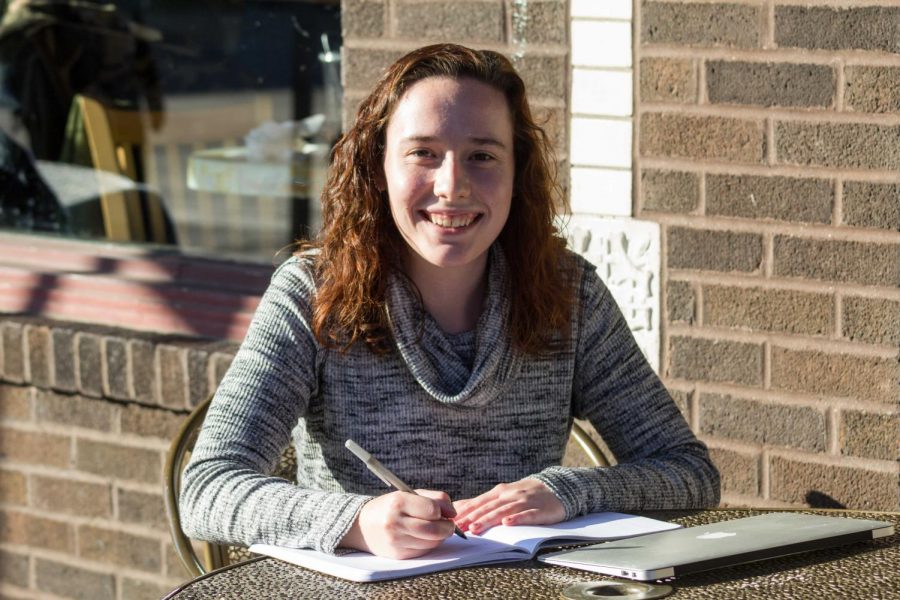Undergraduates showcase literary criticisms in on-campus journal
Co-editor in chief of Re:Search, a literary criticism journal, Hannah Downing, does most of her work at Espresso Royal on Sixth and Daniel. The journal showcases submitted literary work from students all across campus.
Nov 9, 2017
Submitting work to on-campus publications is a great opportunity for students to have their work reviewed by other students and faculty.
This week, buzz sat down with Hannah Downing, co-editor and chief of Re:Search, the undergraduate literary criticism journal and talked about the journal’s important role on campus and how students can get involved.
buzz: What is Re:Search? What kind of works are published in Re:Search?
Hannah Downing: Re:Search is the undergraduate literary criticism journal here at UIUC. Though we say we’re a literary criticism journal, we actually publish any kind of textual criticism as long as it’s rooted in some form of media.
For example, a prospective author doesn’t need to write on a traditional literary medium, such as a play, novel or poem, in order to be considered for publication. We’ve had people write about graphic novels, video games, TV and movie adaptations of books and even liner notes of albums.
Get The Daily Illini in your inbox!
The possibilities are endless, as long as the prospective author has a primary text/media they are in critical conversation with.
The articles we publish are usually around 15-25 pages and are published both in our print versions and online through the Online Journal System, which also makes our journal and its articles searchable on Google Scholar.
buzz: What are some examples of pieces that have been published by Re:Search?
H.D.: Some examples of past papers are an analysis of the literary canon when considering TV and film adaptations, with case studies in Harry Potter and Game of Thrones; performance analysis of Webster’s The White Devil with the author considering her own interpretations when she directed a version of the play; and an analysis of power, authority, and the atomic bomb through Captain America. These are just a few of the many articles we’ve published over our four existing issues, which are all available online.
buzz: How can students get their work published in Re:Search?
H.D.: To be considered for publication, students must submit a proposal in the fall semester, with the deadline usually being early or mid-November. This year our proposal deadline is 11:59 p.m. on Nov. 10.
We like to emphasize that students from any major or discipline can submit a proposal; they do not have to be a student in the English department.
Once proposals are submitted, they go through a triple blind process so that the exec board judges the proposal solely on its contents. We in no way know who has submitted them until after we have made our decisions.
Decision letters are typically emailed out on or before reading day of the fall semester. Accepted authors write their articles throughout the spring semester and undergo editing in April and publication in early May.
buzz: What sets Re:Search apart from other publications on campus?
H.D.: The biggest thing that sets us apart is that we’re solely for undergraduate writers, which is especially important for academic publishing.
There is a lot of interest and talent in in-depth undergraduate academic writing, but there isn’t always space for them to be showcased outside of the classroom. This is especially because they often have to compete with graduate students when submitting to other journals, which can be difficult since graduate students tend to have more experience with this type of writing.
With our journal, we are offering a platform for undergraduates to have space to themselves so that they can pursue this interest of theirs and get this experience early on.
Not to mention getting published as an undergrad can help with grad school applications!
I also wanted to say you don’t have to be an author to be involved! I’ve been super involved since my sophomore year (I’m a senior now) and I haven’t once been an author.
In the fall, we look for students to serve as peer reviewers which is a very important and unique part of our publication process. We will be looking for peer reviewers in just a few weeks!
In the spring, we look for copy editors, format editors, and we send out applications for open exec board positions.
Being involved with a journal like this is a unique experience for undergrads, no matter what role you have, so I always encourage other students to take advantage of it if they think it’s something they’d be interested in.






